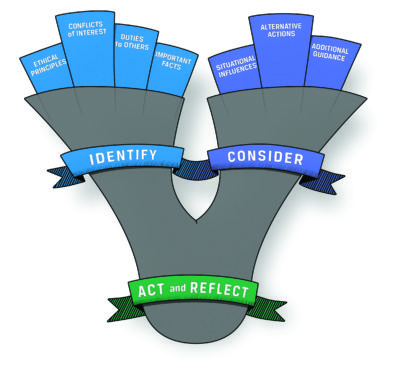Ethics in Practice: Political Expression. Case and Analysis–Week of 21 January
How did you do evaluating this week’s (21 January) case? Check out the analysis below.
Case
Ziegenthaler is an analyst and trader for a large global asset management firm. The president and CEO of the firm is a legendary figure in the investment industry and appears regularly on global financial television programs as a commentator. Videos of these appearances routinely show the CEO sitting in the firm’s trading room with the traders’ workstations featured in the background. Ziegenthaler’s workstation and computer screen are often clearly visible during the CEO’s television appearances.
In addition to working as an analyst for the firm, Ziegenthaler is a passionate supporter of an animal rights organization that protests the use of animal fur and hides by the fashion industry. During the CEO’s next television appearance, and unnoticed by the program’s producers, Ziegenthaler pulls up a graphic anti-fur poster on her computer screen so that it can be seen by viewers. Several of the firm’s clients, including members of the family of a prominent fashion house, are offended by the graphic and complain to the firm. Ziegenthaler’s actions are
- inappropriate because she was using employer resources without permission.
- inappropriate because her actions reflected poorly on her professional reputation or integrity.
- appropriate because she is free to express her personal views on a topic unrelated to work.
- appropriate because her actions did not cause financial harm to her employer.
- none of the above.
Analysis
This case relates to the professional conduct of an investment professional and her duty to her employer. CFA Institute Standard of Professional Conduct IV(A): Loyalty (to employer) requires CFA Institute members to act for the benefit of their employer and not cause harm to their employer. In addition, Standard I(D): Misconduct states that CFA Institute members must not commit any act that reflects adversely on their professional reputation or integrity. As a general matter, investment professionals are free to voice and act on their political beliefs outside of their work environment. Standard I(D) is not meant to curtail freedom of expression or address conduct (or even acts of civil disobedience) in support of personal beliefs as long as that conduct does not reflect poorly on the member’s professional reputation or competence.
Ziegenthaler’s beliefs related to animal rights, in and of themselves, are not related to her professional competence and do not reflect poorly on her reputation or integrity. But in this case, Ziegenthaler surreptitiously uses resources and a platform made available to her through her employer to express and promote her views. These actions caused her employer at least some reputational harm with its clients, as evidenced by their complaints. As a result, Ziegenthaler’s actions are inappropriate. Choice A is the best answer.
Let us know what you think of Ethics in Practice by taking this short survey.
Have an idea for a case for us to feature? Send it to us at [email protected].
More About the Ethics in Practice Series
Just as you need to practice to become proficient at playing a musical instrument, public speaking, or playing a sport, practicing assessing and analyzing situations and making ethical decisions develops your ethical decision-making skills. The Ethics in Practice series gives you an opportunity to “exercise” your ethical decision-making skills. Each week, we post a short vignette, drawn from real-world circumstances, regulatory cases, and CFA Institute Professional Conduct investigations, along with possible responses/actions. We then encourage you to assess the case using the CFA Institute Ethical Decision-Making Framework and through the lens of the CFA Institute Code of Ethics and Standards of Professional Conduct. Then join the conversation and let us know which of the choices you believe is the right one and explain why. Later in the week, we will post an analysis of the case and you can see how your response compares.
Image Credit: ©CFA Institute


Clearly “A”. Inappropriate use of employer’s resources for personal purposes, not to mention poor judgment. Almost all of us in the profession have views about issues in public policy, but in public forums we need to maintain boundaries between personal opinions unrelated to investments, opinions on investments about which we are expert, and facts.
I think there is a typo in option b
Thank you for letting us know.
Ans is A